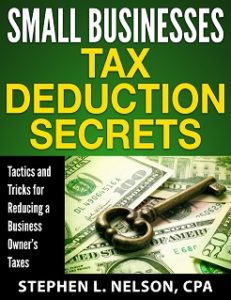
I’ve got a new idea to really boost the profitability of my small CPA firm.
You might want to try something similar, so I’ll share the gambit. (Keep this secret, though, okay?)
The idea goes like this: Rather than charge clients a fixed fee for a particular tax return (say, $500 or whatever), we’re going to rent tax returns to people for some nominal amount such as, oh, I don’t know, $30 a month.
Clients who don’t think through the math will think they’re getting a great deal. But here are the two catches—and the reasons we could stand to make a bundle: One, people will probably forget about the monthly subscription fee until they see it appear on their credit card statement again. (So this will automatically give us a few months of sure, steady cash flows.)
Then there’s a bigger reason this subscription-based service may turn into a cash cow if we don’t alienate too many clients. In reality, people will probably need to rent their tax return (and pay us a modest monthly subscription fee) for at least a couple of years, maybe as long as three or four years, from the date the return gets filed due to the statute of limitations.
Note: If this extension of time seems curious, remember that people will want previous tax returns for things such as mortgage applications and for subsequent years’ tax returns and for any IRS or state revenue agency audits that occur.
I’m Only Joking
The plan shared in the preceding paragraphs isn’t really our plan. You know that, right? We would never do something like this. Never.
But the reality is this: the subscription-fee approach used by too many big companies seems to me to work, on a practical level, very similarly to what is described earlier.
A technology tool you or I used to be able to buy for $200 now requires a $20-a-month subscription. Something you or I used to license for a one-time fee of $500 now costs $30 a month.
And because we’ll pay these amounts for years, our total costs can dramatically increase. Especially if we need to continue to pay the monthly subscription fee for a long stretch of very casual, very occasional use, a long stretch that may be due to something such as legal document retention requirements or tax law statute-of-limitations issues.
I’m not sure exactly what we do about this. The subscription-style pricing approach seems to be the new way large companies—and particularly large technology companies—operate. But I have a couple of ideas that maybe we small businesses can use to better assess and more smartly manage this type of cost.
Carefully Assess Total Cost of Ownership Before You Subscribe
Here’s a first tip: As hinted at earlier, you and I need to carefully add up the total costs of ownership.
Take the example of the accounting software that many new vendors now sell via a subscription model. Remember that federal and state statutes of limitations will mean that you need to continue to pay the monthly fee for years after you close down your business.
Don’t, therefore, think about a $30 monthly subscription fee. And for heaven’s sake, don’t compare that to the old $500 one-time price.
Rather, multiply the $30-a-month fee by the 60 months or whatever you’ll be required to pay the fee. And compare that result, $1,800, to the old price and to your budget.
You need to be particularly careful about subscription fees for products that connect to accounting, legal, or tax products because of the way the statute of limitations works.
For example, consider the time you’ll be required to use accounting software if in year 1, you briefly run a small business that you close down at year end due to lack of profits.
In this case, you will probably file your tax return for this small business sometime in the spring of year 2 (on April 15, for example). And this may mean that you practically need to continue subscribing to the service through April 15 in the spring of year 5 because that’s when the statute of limitations on the tax returns you file using the accounting system will finally end.
Note: Some states may require longer subscription periods due to longer statute-of-limitation periods. In Washington State, for example, the state can go back to the previous four years.
Do Good Accounting of Your Subscription Costs
I have another idea for you too, and this applies both to subscriptions you pay in your business and subscriptions you and your family pay personally.
Within your and my accounting systems, we absolutely want to segregate out subscription fees—all of them. This will let us easily review the amounts these fees total and more easily spot subscriptions we can or should cancel.
We definitely don’t want to bury subscription fees inside other expense categories where they get lost.
Here’s another related best practice with regard to subscription fees. Probably you should not agree to any subscription that you can’t easily account for.
Tip: Be careful, too, about subscription fees you pay inside of another bill. I don’t know how long, for example, I was paying my cell phone carrier a monthly fee for lightly used and mostly unneeded navigation services, which was crazy, but the $2 or $3 was buried in a large monthly bill with dozens of other charges.
Final Comment: Not All Subscriptions Are Uneconomical
This post needs to be tempered with an acknowledgement: some of the subscription fees you and I pay for business or personal reasons surely are reasonable.
What about the traditional subscription-style products and services, such as newspapers and magazines? Hey, that pricing seems totally appropriate. I am not sure I can live without my daily Wall Street Journal or weekly Economist.
Furthermore, many digital services from small and medium sized technology companies really are for ongoing services. In our CPA firm, for example, we happily pay a small fortune for a Cadillac tax library from BNA, a modest monthly charge for the robust e-junkie digital goods fulfillment service, and a reasonable quarterly charge for our secure ShareFile portal from Citrix. And we love this stuff. And we get great value.
Too many big technology companies, however, aren’t really using the subscription style of pricing to provide ongoing services but rather, it seems, as a clever way to increase prices.
And so I think we need to do good accounting for this stuff.
Are You a Business Owner Looking to Save Taxes by Bumping Deductions?
 You might be able to save a bundle on your income and payroll taxes by getting strategic about maximizing your business tax deductions.
You might be able to save a bundle on your income and payroll taxes by getting strategic about maximizing your business tax deductions.
No, seriously. You might. Small-business owners regularly don’t do a good job of structuring their operations to protect legitimate deductions, to create new deductions, and to recycle (or double-deduct) the deductions that can be used more than once to save taxes.
If this sounds like your situation, you should consider buying and reading our $40 ebook Small Businesses Tax Deduction Secrets. This 70-page ebook, which of course comes with a money-back guarantee, provides detailed instructions about how business owners can annually save thousands or even tens of thousands of dollars in income and related taxes simply by more effectively using legitimate small-business tax deductions.
Tip: If you are a client of our CPA firm, you don’t need to purchase this ebook—or any of our others. Just email us and ask for your complimentary copy. Also, if you’re in the process of becoming a client, don’t buy the ebook yet. Rather, wait until we’re working together. We’ll then provide you with your complimentary copies.
Instantly Downloadable & Money-Back Guarantee
The book is instantly downloadable. You get the ebook when you purchase it. (We also send you an email after your purchase with a link you can also use to download the ebook PDF.)
By the way, we provide a money-back guarantee. If you don’t find the information you need or want, no problem. Just email us and request your refund.